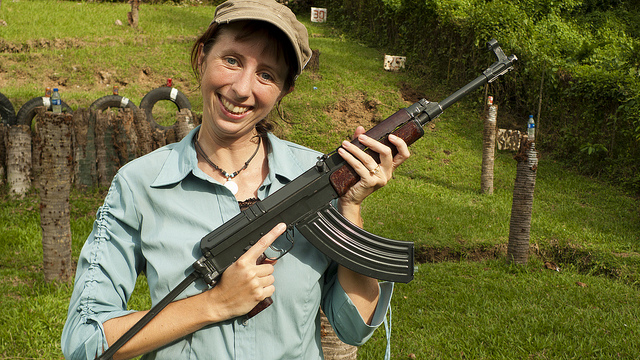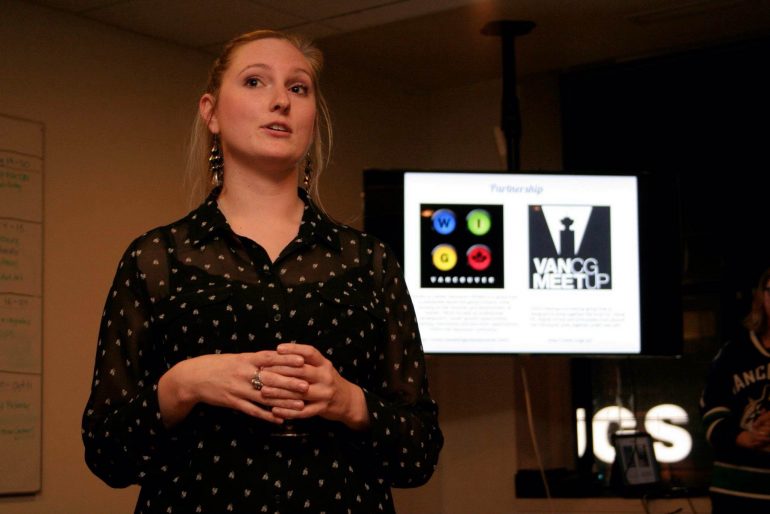It’s 2015, but some gaming companies still seem to be deliberately trying to get females to unlearn whatever love they have of video games while antagonizing any dude who doesn’t want to feel like he’s reading Hustler on the bus when his wife sees him logging into Steam (seriously, Dragon’s Crown developers — what were you thinking?). When it comes to the way women are portrayed in games, change is coming slowly, but it is coming — thanks to the increasing number of women who are making games.
The numbers can be discouraging, but at least they’re trending in the right direction. The good news: more female game developers than ever are getting hired. The bad news, according to surveys: just 22 percent of that workforce is women. Meanwhile, more than half of gamers out there are women.
The situation is evolving, though, thanks to women who are driving that change.
Getting WIGeh with it
Ashley Scott is the co-organizer of Women in Games Vancouver (WIGeh), a networking event for women who are interested in working in the game industry, or already in it. She’s also a producer for the local game developer, Blitzoo.
“I’ve been in the industry for 8 years now. Certainly, it was a boys club – and maybe I was more soft-spoken when I was starting out,” Scott said. “Even a few years ago, you could see examples like only 11 percent of game designers were women.” Scott also said that a lot of change has happened just in the last few years, with more women becoming coders and getting design degrees to go into the gaming industry.
“The shift to mobile games was huge. When you could play games on Facebook, now you could see your grandmother playing games for the first time. That demographic just opened up.”
WIGeh’s events tend to fill up fast. It’s a place to talk shop, meet prospective employers and get mentorship. It’s also, perhaps counterintuitively, an event that’s quite popular with the dudes. “One rule in place when I started with WIGeh was that only females were invited and men weren’t allowed,” Scott said. “That’s one of the first things I changed. I felt we should really open up the group to everyone. After all, don’t we want to be inclusive? We do ask that if you are a guy who would like to attend on of our events that you bring a woman with you, which helps to keep up the female numbers at our events; that is, after all, a challenge in the industry generally.”
Scott started out on the marketing side of things, working her way up through the gaming field. “I didn’t seek out this industry,” she said. “At the time, I was just looking for marketing jobs in Vancouver. I found this opportunity in a game studio, which worked because I was interested in startup culture. Now I’m a producer, taking a product from start to finish. It seems to be a no-brainer for some guys to know about these kinds of opportunities and seek them out, but it hasn’t always been this way for females.”
I asked Scott what’s changing this dynamic, leading (slowly) to more women looking for work in this field and landing those jobs. “Partly, it’s a recognition by employers that they want different qualifications and personalities,” she replied, noting that as more women are hired, it’s leading to changes in how the games are built. “For instance, I’ve noticed with games we’ve worked on where we’ve started putting more focus on the gear that characters in games can get to enhance their look. Women seem to be more into customizing that look, rather than focusing on the machinery they’re wielding.”
Part of the drive for change is a result of how we play games today, compared to even a few years back. “The shift to mobile games was huge,” Scott said. “When you could play games on Facebook, now you could see your grandmother playing games for the first time. That demographic just opened up. It’s no longer about targeting that small niche.”
Perhaps the biggest trend over the last few years in gaming is the rise of the indie developer – and that’s an area where really interesting women are paving the way, Scott says. “We’re now seeing a lot of game developers who are funded through sponsors or launching through Steam. They’re going through gaming conferences and getting exposure they just didn’t get previously. They’re pushing the boundaries of what’s out there.”
Rebuilding the world, one game at a time

Sarah Northway is one of those indie game developers who is killing the old stereotypes and living her dream. Her Rebuild series of zombie-apocalypse-meets-SimCity games has won critical acclaim and hordes of paying fans, particularly for her latest, Rebuild 3. Gangs of Deadsville, which is going on to even bigger success with its mobile release (full disclosure: according to Steam’s time log, this writer has literally spent several weeks of his life with Northway’s addictive creations, rebuilding civilization and waging war on the undead and various belligerent factions). She just got back recently from the Penny Arcade Expo, where she was representing her latest game, Fantastic Contraption. She’s lived and breathed game development for all of her professional life – but she has a few ideas about why that wasn’t the case for so many of her female friends.
“Why didn’t more girls play games when I was playing them as a kid? Part of it is not having many female characters to relate to. When I was young, I didn’t even think about it. I always played games as a white boy with blonde or red hair. I liked games where I could customize my character, but early on, they didn’t let me choose the gender. It’s so strange that I didn’t think about it before – but I think a lot of women and girls just don’t realize it.”
Northway doesn’t think game developers in the 1980s or ‘90s were necessarily looking to exclude girls from the picture – but that in some cases, it was more about sheer laziness. “Storytelling was always about a damsel in distress, with a hero who had to save someone weaker than themselves. That they had no female heroes who broke stereotypes is a function of their lack of creativity.”
Attached to that was a problem with the philosophy of game design. “I think they thought the story would get in the way of the gameplay, that it would be distracting,” Northway said. Now games are paying much more attention to storytelling, she says. “It’s not the same game. It’s getting better. Women can see themselves in the story, now.”
“Why didn’t more girls play games when I was playing them as a kid? Part of it is not having many female characters to relate to. I always played games as a white boy with blonde or red hair.”
Gender, inequality, and inclusivity were themes explored to a surprising extent in Northway’s Rebuild 3. Players choose policies for their faction; one of the policies is whether your women characters can be soldiers. There’s the Last Judgement Gang, a misogynist bunch of bible belt bikers with vile attitudes towards women and homosexuals. There’s the Dahilias, a faction of machine-gun toting women in power suits. The 1337cREw is led by a female coder who tries to bring down the military, who are in turn led by a female general who likes to solve her problems with shock and awe.
The themes are explored even more deeply in the many backstories for the characters in your faction, who often go on about their own gender issues or ambivalence. Within your group of survivors, you’ve got same-sex dating and marriages happening as a matter of course – in a way that no game has done before.
“The women-working-thing was my reaction to reading the Walking Dead,” Northway said. “There’s all these scenes where the women are just doing the laundry in the background, bitching about how the men aren’t killing the zombies fast enough. I wanted players not necessarily to make a ‘right’ decision, but be thinking about this stuff, starting a conversation around women not being allowed to do dangerous work.”
Putting gender and the politics around it into her game was a choice that she thinks worked for this game – though the feedback wasn’t all positive. “As I was adding relationships to the game early on, there were people who were asking me to give them a way to take all that politics and gender stuff out. They kept saying, when I come from a long day at work, I don’t want to worry about politics or play a game that challenges me. I do get that – they don’t want to be dealing with a game telling them they’re racist or sexist or whatever. But then, this game is a sandbox. Me taking that aspect out of the world wouldn’t be a fix. If you’re feeling challenged, that’s your own weird guilt acting up… so I put even more of that stuff in!”
Looking back on her successful career in gaming, Northway explains that even though there weren’t that many women who went with her into computer science and then into this industry, she hasn’t felt like it’s a boy’s club. “Maybe it’s different in triple-A gaming. I’ve always worked with smaller, more independent firms. I didn’t wait to be invited.
“I got into games because I wanted to make the kind of games I would play. If you feel like there’s a space where you’re not seeing the type of games you want to play, you should be the one making those games.”


